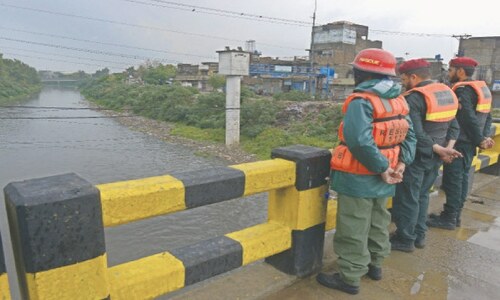ISLAMABAD: For the first time, the federal government will have the power to hold private hospitals and testing laboratories accountable and will be able to help patients seek compensation against negligence as last week, the federal cabinet decided to establish a healthcare commission or a federal health regulatory authority.
The summary for this will be tabled in parliament and the commission or authority, whichever is decided on, will be established by the Ministry of National Health Services (NHS) if granted approval. The regulatory body will be run by a chief executive officer and will have nine members in its policy board.
There is currently no regulatory authority at a federal level to look into the complaints received against private medical facilities including hospitals and laboratories.
NHS Director General Dr Asad Hafeez told Dawn that the medical facilities will also have to get licenses from the regulatory authority for providing certain services such as caesarean sections.
He said the ministry had started working on this in 2014 and that the draft was tabled in the federal cabinet for initial approval after which it was sent to parliament and was refined based on the amendments suggested by parliament’s standing committees.
There is currently no watchdog at the federal level to take action against private medical facilities, look into patient complaints
“It was sent to the federal cabinet for final approval to table as a government bill in parliament. We expect that it will sail through parliament smoothly after which we will finalise a regulatory authority,” he said.
“The Pakistan Medical and Dental Council (PMDC) regulates health professionals and this regulatory authority will also look over homeopaths, ayurvedics and various health facilities,” he said.
Dr Hafeez said the authority’s policy board will be comprised of nine members of which seven will be elected and two will be nominated by the federal government. The post of chairperson of the board will be ceremonial as the chairperson will not be paid a salary, though the CEO will be paid.
“Teams from the regulatory authority will visit health facilities and issue them licences for performing only those procedures and providing only the treatments for which they are equipped,” he said.
“There will be separate hospitals for major surgeries. The proposed authority will conduct regular inspections and will have the power to look into complaints,” he added.
A doctor of the Pakistan Institute of Medical Sciences said that in addition to regulating health facilities, hospitals, diagnostic laboratories and radiological centres, the regulatory authority will also be formulating a standard treatment protocol in order to ensure the provision of quality health facilities to patients and protect their interests.
“Health institutions are misused by people who make money by playing with the health and lives of people and there is no regulatory authority to look into this.
“There are also no laws and regulations for establishing hospitals and for running them. There is a mushroom growth of diagnostic labs and radiological centres in the country and no one knows what types of procedures are conducted in them, what sort of professionals are working there and what equipments they are using,” he said.
The establishment of the authority will also mean substandard medicines will not be used any more as it will be possible to take action against hospitals, he explained.
The health sector was devolved to the provinces in the 18th amendment to the Constitution. Regulatory bodies have been established in Punjab, Khyber Pakhtunkhwa and Sindh but there was no proper organisation to deal with the health issues in the federal capital.
Many complaints are lodged with the PMDC against hospitals which is not fully empowered to deal with them. PMDC also does not have the force to implement its orders and relies on the Federal Investigation Agency for this.
The proposed bill suggests the regulation of the provision of healthcare services, standardisation, certification, quality assurance, the establishment of a registration board, the registration of healthcare facilities, licensing, inspections, elimination of quackery, enforcement of law and addressing grievances.
According to an official, healthcare professionals have to register themselves under the Medical and Dental Council Ordinance 1962, the Pakistan Nursing Council Act 1973 or the Unani, Ayurvedic and Homeopathic Practitioners Act 1965.
“Councils can suspend registrations of health care professionals in case they have fake degrees but they cannot seal clinics, hospitals or laboratories,” he said.
“Due to lack of accreditation, hospitals which are not even properly equipped have intensive care units and are charging the same fees as well-equipped hospitals,” he said.
The official suggested that the regulatory body should be made independent so it can take action against hospitals and labs without pressure.
Published in Dawn, September 18th, 2017














































